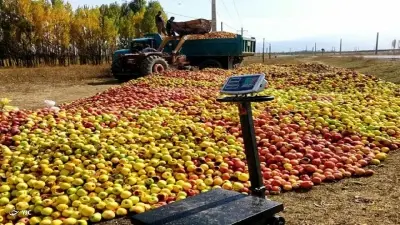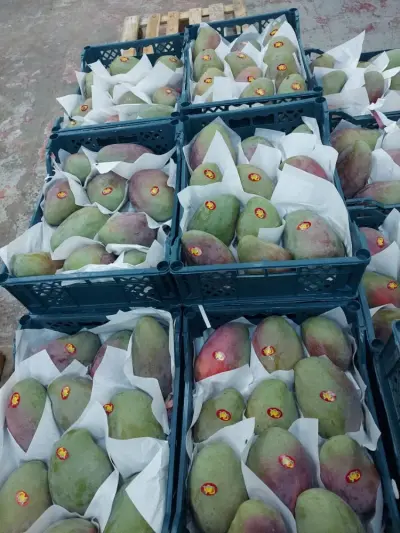Regarding the most fruit exports from the Middle East, some countries and Middle East countries that have the most fruit exports are:Iran : Iran is one of the largest fruit producers in the Middle East and exports various fruits such as dates, apples, grapes, peaches and apricots to other countries

As the largest economy in the region, Saudi arabia imports a substantial amount of Fruit to meet domestic demand. Due to its arid climate and limited agricultural capacity, the country relies heavily on imports to ensure a steady supply of fresh fruits. The UAE, particularly Dubai, serves as a major hub for international trade and re-export in the region. With a significant expatriate population and a booming hospitality industry, the country imports a substantial quantity of fruits to cater to local demand as well as for re-export to neighboring countries. Despite being a major producer of fruits, Iran also imports a significant amount to satisfy its growing consumption patterns. The country's diverse climate allows it to produce a wide range of fruits, but imports are necessary to meet the demand for certain varieties throughout the year.
Iraq's agricultural sector has faced challenges due to years of conflict and limited infrastructure. Consequently, the country relies on imports for a considerable portion of its fruit consumption. With limited agricultural land and water resources, Kuwait imports a significant amount of fruits to meet local demand. The country's high per capita income and consumer preferences for a variety of fruits contribute to the need for imports.
The status of fruit export and import in these countries may depend on annual changes and market conditions. This fruit market in the Middle east includes domestic and international trade. Middle East countries may export their domestically produced fruits to other countries and also import fruits that are not produced domestically. Also, the international trade of fruits also takes place in this competitive market, and fruit producing countries try to export their products to other countries in the Middle East.
Most fruit imports in the Middle East usually come from the following countries:
- Turkey : Turkey is one of the largest fruit importers in the Middle East. They usually import a variety of fresh fruits such as oranges, limes, strawberries, pineapples, and bananas.
- Saudi Arabia : Saudi Arabia needs a lot of fruit imports and uses different countries to meet its needs in this field. They mainly import fresh fruits such as dates, oranges, pulp and pineapple.
- United Arab Emirates : The United arab emirates is also one of the largest importers of fruit in the Middle East. They mainly import fresh fruits such as dates, oranges, strawberries and bananas.
Regarding the most fruit exports from the Middle East, some countries and Middle East countries that have the most fruit exports are:
- Iran : Iran is one of the largest fruit producers in the Middle East and exports various fruits such as dates, apples, grapes, peaches and apricots to other countries.
- Turkey : In addition to imports, Turkey is also one of the largest fruit exporters in the Middle East. They export a variety of fruits such as cherries, cherries, plums, grapefruits and strawberries to other countries.
- Israel : Israel is also one of the countries that has the largest export of fruit in the Middle East. They mainly export a variety of fruits such as oranges, limes, grapes and strawberries to other countries.
The Middle East fruit market is affected by various factors, including climatic conditions, domestic and foreign demand and consumption, trade policies, export and import laws and regulations, competition with other countries, as well as political and economic influences in the region. Turkey is one of the largest exporters of fruits in the region. Its diverse climate and fertile agricultural lands enable the production of various fruits, including cherries, apricots, figs, pomegranates, and citrus fruits. Turkish fruits are exported to numerous countries in Europe, the Middle East, and beyond. Despite its relatively small size, Israel has made significant advancements in agricultural technology and practices. The country is known for its high-quality fruits, including citrus fruits, avocados, grapes, and dates. Israel exports its produce to various markets worldwide.
Along with being a major importer, Iran is also a significant exporter of fruits. The country's favorable climate and extensive agricultural activities enable it to cultivate and export a wide variety of fruits, such as dates, pistachios, pomegranates, apples, and grapes. Although Egypt is predominantly located in North Africa, it shares close ties with West asia and is considered part of the region. Egypt's fertile Nile Delta allows for the cultivation of various fruits, including citrus fruits, grapes, and mangoes. The country exports a significant quantity of fruits to neighboring countries and international markets. Jordan has a favorable climate for fruit production, particularly for citrus fruits, grapes, and olives. The country exports fruits to regional markets, including the Gulf countries, as well as to Europe.





